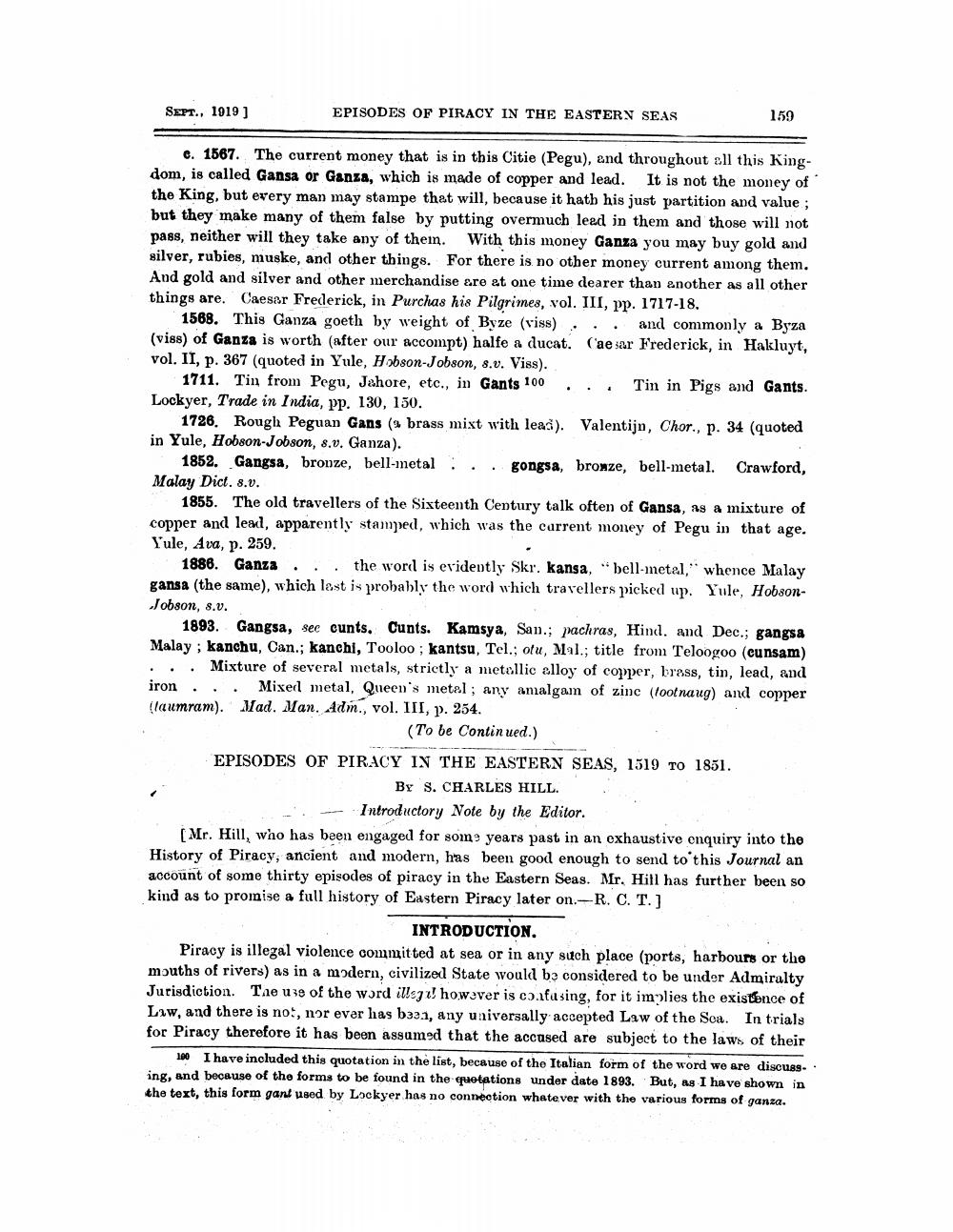________________
SEPT., 1019 ]
EPISODES OF PIRACY IN THE EASTERN SEAS
159
e. 1567. The current money that is in this Citie (Pegu), and throughout all this kingdom, is called Gansa or Ganza, which is made of copper and lead. It is not the money of the King, but every man may stampe that will, because it hath his just partition and value ; but they make many of them false by putting overmuch lead in them and those will not pass, neither will they take any of thein. With this money Ganza you may buy gold and silver, rubies, muske, and other things. For there is no other money current among them. And gold and silver and other merchandise are at one time dearer than another as all other things are. Caesar Frederick, in Purchas his Pilgrimes, vol. III, pp. 1717-18.
1568. This Ganza goeth by weight of Byze (viss)... and commonly a Byza (viss) of Ganza is worth (after our accompt) halfe a ducat. (ae sar Frederick, in Hakluyt, vol. II, p. 367 (quoted in Yule, Hobson-Jobson, s.v. Viss).
1711. Tin from Pegu, Jahore, etc., in Gants 100 .. Tin in Pigs and Gants. Lockyer, Trade in India, pp. 130, 150.
1726. Rough Peguan Gans (a brass mixt with lead). Valentijn, Chor., p. 34 (quoted in Yule, Hobson-Jobson, s.v. Ganza).
1852. Gangsa, bronze, bell-metal ... gongsa, bronze, bell-metal. Crawford, Malay Dict. 8.v.
1855. The old travellers of the Sixteenth Century talk often of Gansa, as a mixture of copper and lead, apparently stamped, which was the carrent money of Pegu in that age. Yule, Ava, p. 259.
1886. Ganza..the word is evidently Skr. kansa, bell-metal," whence Malay gansa (the same), which last is probably the word which travellers picked up. Yule, HobsonJobson, 8.v.
1893. Gangsa, sec cunts, Cunts. Kamsya, San.; pachras, Hind. and Dec.; gangsa Malay; kanchu, Can.; kanchi, Tooloo; kantsu, Tel.; ou, Mal.; title from Teloogoo (cunsam) ... Mixture of several metals, strictly a metallic alloy of copper, brass, tin, lead, and iron... Mixed metal, Queen's metal; any amalgam of zinc (tootnaug) and copper (laumram). Mad. Man. Adm., vol. III, p. 254.
(To be Continued.) EPISODES OF PIRACY IN THE EASTERN SEAS, 1519 TO 1851.
By S. CHARLES HILL.
- Introductory Note by the Editor. [Mr. Hill, who has been engaged for some years past in an exhaustive enquiry into the History of Piracy, ancient and modern, has been good enough to send to this Journal an account of some thirty episodes of piracy in the Eastern Seas. Mr. Hill has further been so kind as to promise a full history of Eastern Piracy later on.-R. C. T.]
INTRODUCTION. Piracy is illegal violence committed at sea or in any such place (ports, harbours or the mouths of rivers) as in a modern, civilized State would be considered to be under Admiralty Jurisdiction. The u39 of the word illsg al however is coafasing, for it implies the existence of Law, and there is no , nor ever has b331, any universally accepted Law of the Sou. In trials for Piracy therefore it has been assumed that the accused are subject to the laws of their
190 I have included this quotation in the list, because of the Italian form of the word we are discuss.. ing, and because of the forms to be found in the quotations under date 1893. But, as I have shown in the text, this form gant used by Lockyer has no connection whatever with the various forms of ganza.




